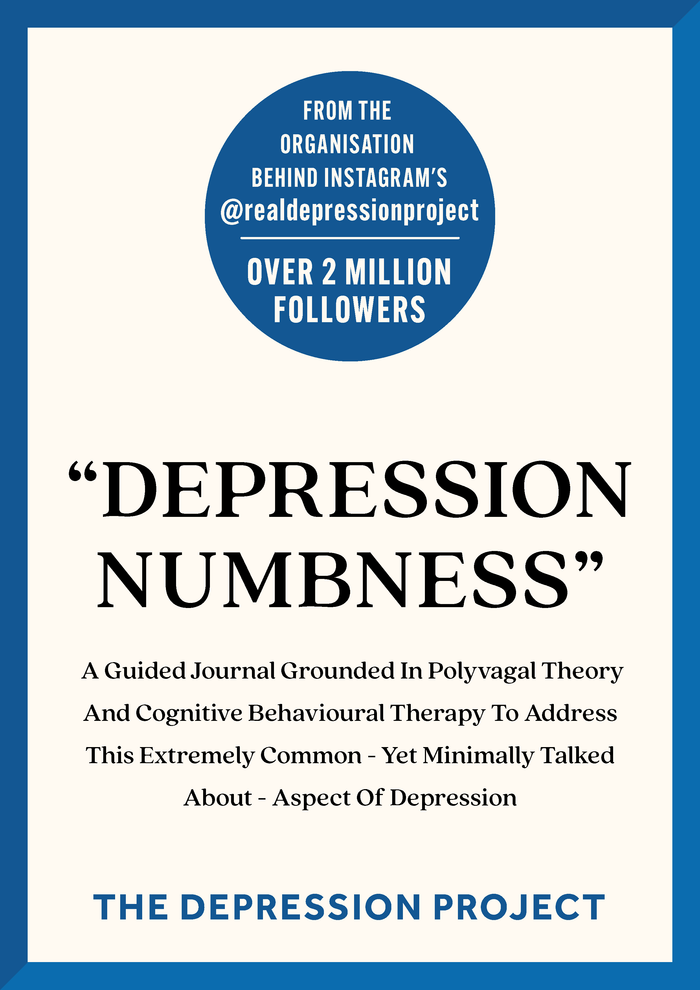If you've been following The Depression Project on Instagram, then something you may have heard us mention before is how common it is for people with depression to at times feel numb. And, if you can relate, then right now, we'd like to share with you a free excerpt from our "Depression Numbness" Journal that details what actually causes you to feel "depression numb".
Are you ready?
What Causes You To Feel "Depression Numb"?
"Depression Numbness" Can Be Your System’s Way Of “Protecting You” From Pain That It Perceives To Be Unavoidable1
As humans, we have what’s called an autonomic nervous system – the role of which, according to Deb Dana in her book Anchored: How to Befriend Your Nervous System Using Polyvagal Theory, is to “store, conserve and release energy to help us safely move through our daily lives"1. And, like she also says, our “nervous systems are aware of signs and signals of danger”1. In this way, you have what can be thought of as an “internal surveillance system”, a “self-protective circuit” or a “threat detector” that’s continuously determining how safe the situation you’re in is.
Now, in terms of how it decides how safe the situation you’re in is, your threat detector has what can be thought of as a “database of past information” – and inside this database are all of your life experiences (including the good, the bad, the ugly, and everything in between). And, automatically and really, really quickly, your threat detector consults this database to determine whether the situation you’re in is safe, dangerous or life-threatening.
For example, let’s say that you look outside your window and spot a tree. In this instance, your threat detector will look to your database and think, “trees … what do we know about trees? Well, I lived in a forest as a kid … trees were safe … I never fell out of a tree, and a tree never fell on me”. In this very simple example, your threat detector would conclude that you’re “safe”, and as a result, your nervous system will be in its ventral state1 – i.e. it’s “safe state” – which is the state associated with being, for example, relaxed, happy, calm, free, interested, curious, enthusiastic, confident, uplifted, etcetera.
However, let’s say that instead of determining that you’re safe in a given situation, your threat detector concludes that you’re facing danger. In this instance, your nervous system will be in its sympathetic state1 – i.e. its “state of mobility” – which is associated with, for example, racing thoughts, a pounding heart, anxiousness, worry, frustration, anger, fear, panic, stress, tension, etcetera. This is your system’s way of trying to protect you from the danger it perceives, by telling you: “there’s no time to relax – you have to do something now! You have to take action in order to feel safe again!”
Now lastly, let’s say that your threat detector concludes that there’s no way to escape from the danger – in the sense that there is nothing that can be done to stop you from feeling pain, and that the situation is completely hopeless. In this case, your system will be in its dorsal state1 – i.e. its “shutdown state” – which is associated with, among other things, being apathetic; feeling separate from the world; and indeed, feeling numb. This is your system telling you: “I can’t help you get away from this pain, but what I can do is cloak you in numbness so that you don't have to feel it. You can leave your body. You can lose contact with your feelings and completely shut down”.
And, in this way, “depression numbness” can be your system’s way of protecting you as best as it can from all of depression’s most painful symptoms – such as misery, worthlessness and hopelessness, for example.
Secondly, “Depression Numbness” Can Also Be A Side-Effect Of Medication2
Additionally, as you may have experienced, even though it can be immensely helpful, “depression numbness” can also sometimes be a side effect of anti-depressant medication.
Thirdly, Substance Abuse Can Also Contribute To You Feeling “Depression Numb"3
When consumed with depression’s crippling, debilitating, seemingly unbearable symptoms, as you’re likely aware, it’s common for people to attempt to numb them by engaging in substance abuse.
End of free excerpt
We hope you found this free journal excerpt informative, our friend.
All our love,
The Depression Project Team.
P.S. In addition to helping you better understand the causes of "depression numbness", we created The "Depression Numbness" Journal in order to:
- Help you feel like you're not alone;
- Help you break out of “depression numbness” - so that you can get back to experiencing joy and pleasure from the things that you usually like doing, be able to think clearer and function more effectively, and be in a better position to take the necessary steps to treat your depression.


